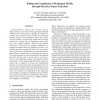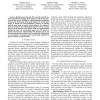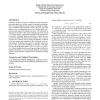1662 search results - page 19 / 333 » The Computational Complexity of Agent Design Problems |
146
Voted
SAC
2005
ACM
15 years 7 months ago
2005
ACM
This paper presents a novel model of reinforcement learning agents. A feature of our learning agent model is to integrate analytic hierarchy process (AHP) into a standard reinforc...
101
click to vote
ATAL
2004
Springer
15 years 7 months ago
2004
Springer
Decision-theoretic models have become increasingly popular as a basis for solving agent and multiagent problems, due to their ability to quantify the complex uncertainty and prefe...
130
Voted
Lecture Notes
Iterative Combinatorial Auctions: Achieving Economic and Computational Efficiency Ph.D. dissertation, Univesity of Pennsylvania, May, 2001.
The focus of this chapter is on the Gen...
63
Voted
ICML
2010
IEEE
15 years 2 months ago
2010
IEEE
Abstract--Reinforcement learning (RL) research typically develops algorithms for helping an RL agent best achieve its goals-however they came to be defined--while ignoring the rela...
124
Voted
ATAL
2003
Springer
15 years 7 months ago
2003
Springer
Distributed problem solving by a multiagent system represents a promising approach to solving complex computational problems. However, many multiagent systems require certain degr...



